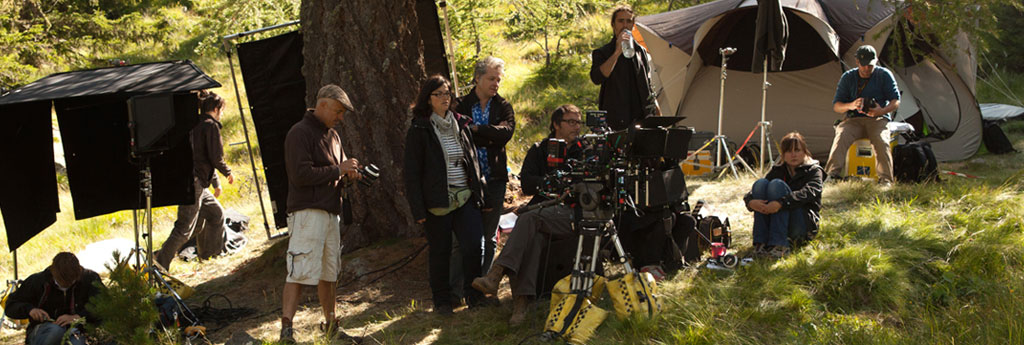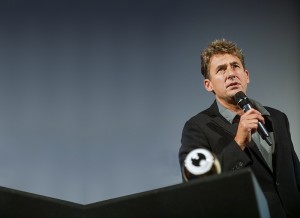
The epic action-adventure Jurassic World by Colin Trevorrow for which Steven Spielberg returned to executive produce, exemplifies Universal’s on-going commitment to environmentally conscious practices on feature films. The crew reduced their overall paper usage by implementing expansive digital distribution practices. Various plants and trees used throughout the sets were donated to theAudubon Nature Institute in New Orleans, helping to beautify a local non-profit. In addition, they spearheaded the first Universal Picture’s comprehensive production food donation program in New Orleans. This program reduced the amount of excess prepared food sent to landfills, and helped to feed those who are food insecure in the New Orleans area.
NBCUniversal is making a commitment to sustainability across the entire company. The Green is Universal initiative is focused on bringing an environmental perspective to everything they do, informing and entertaining their audiences while driving more sustainable practices into their own operations. As one of the world’s largest media and entertainment companies, they want to participate in and help lead one of the most important dialogues of our time—and build a stronger business and a more sustainable world in the process.
 In March 2014, NBCUniversal implemented a “Zero Waste" recycling program on the Universal Studios lot, helping to significantly reduce the amount of material sent to landfill from corporate and production offices, facility operations and production stages. Developed with the participation of NBCUniversal employees, the program provides compost, recycling and landfill receptacles, making it easy to separate food and food-related materials out of the waste stream and keep recyclables clean and dry. In 2014 this program resulted in about 1150 tons of materials recycled and 750 tons composted, an increase of 66% over the previous year.
In March 2014, NBCUniversal implemented a “Zero Waste" recycling program on the Universal Studios lot, helping to significantly reduce the amount of material sent to landfill from corporate and production offices, facility operations and production stages. Developed with the participation of NBCUniversal employees, the program provides compost, recycling and landfill receptacles, making it easy to separate food and food-related materials out of the waste stream and keep recyclables clean and dry. In 2014 this program resulted in about 1150 tons of materials recycled and 750 tons composted, an increase of 66% over the previous year.
The Universal Studios “Jules Stein” Building 50,000 square foot third floor renovation prioritized sustainable building practices that exemplified NBCUniversal’s commitment to environmental protection. A new HVAC system was installed, along with LED lighting with occupancy sensors for energy conservation. Furniture in the building was sourced within 50 miles of the studio and low flow sinks and toilets were installed to save water. The project used locally harvested materials and recycled building materials in construction, and nearly all waste from the project was recycled. These practices earned the renovation a LEED-CI certification.
Leading the industry, Universal Pictures and the NBCU Television Production Group, partnered with entertainment payroll companies to develop new, entirely digital onboarding systems. These business units produce roughly 85 shows annually, onboarding approximately 50,000 freelance hires per year.The new paperless system will be available throughout the industry, reduce fuel emissions from transportation needs and reduce paper consumption by more than 1,000,000 sheets per year at NBCUniversal alone.
 Universal films which have been produced in a sustainable way include The Theory of Everything with Academy Award winning actor Eddie Redmayne as the renowned astrophysicist Stephen Hawking, who falls deeply in love with fellow Cambridge student Jane Wilde.
Universal films which have been produced in a sustainable way include The Theory of Everything with Academy Award winning actor Eddie Redmayne as the renowned astrophysicist Stephen Hawking, who falls deeply in love with fellow Cambridge student Jane Wilde.
The crew on The Theory of Everything worked actively behind the scenes to reduce their overall impact on the environment. The lumber purchased for set construction carried the Forest Stewardship Council certification, which ensures that it came from responsibly managed forests. Several water refilling stations were set up throughou t sound stages and on location to reduce dependency on single-use plastic bottles. Items like canned and unopened non-perishable food were donated when filming wrapped, to local charities and food banks; and a robust recycling and compost program was always at the ready for cast and crew. In addition, the Assistant Directors included a “Green Fact of the Day” on the daily call sheets to engage the entire production.
t sound stages and on location to reduce dependency on single-use plastic bottles. Items like canned and unopened non-perishable food were donated when filming wrapped, to local charities and food banks; and a robust recycling and compost program was always at the ready for cast and crew. In addition, the Assistant Directors included a “Green Fact of the Day” on the daily call sheets to engage the entire production.
In 2014, NBCUniversal feature film and television productions continued to implement sustainable production practices around the world. Best practices include recycling and composting, the utilization of LED set lighting, purchasing of Forest Stewardship Council certified lumber where available, and food and material donations to the local community where production takes place. In 2014, more than 28,000 meals, representing more than 36,000 pounds of food, were donated by 28 NBCUniversal television and film productions in five different cities.













 Robert Redford
Robert Redford Hannes Jaenicke
Hannes Jaenicke Nic Balthazar
Nic Balthazar Nadeshda Brennicke, Actress
Nadeshda Brennicke, Actress Darren Aronofsky, Director, Noah / Jury President, 65th Berlin International Film Festival
Darren Aronofsky, Director, Noah / Jury President, 65th Berlin International Film Festival Tim Bevan
Tim Bevan Thekla Reuten
Thekla Reuten Rachael Joy
Rachael Joy Nikola Rakocevi
Nikola Rakocevi Nadja Schildknecht
Nadja Schildknecht Michael Bully Herbig
Michael Bully Herbig Lars Jessen
Lars Jessen Helen Hunt
Helen Hunt Douglas Trumbull
Douglas Trumbull Dieter Kosslick, Director Berlin International Film Festival
Dieter Kosslick, Director Berlin International Film Festival Benoit Delhomme
Benoit Delhomme Jeremy Irons
Jeremy Irons